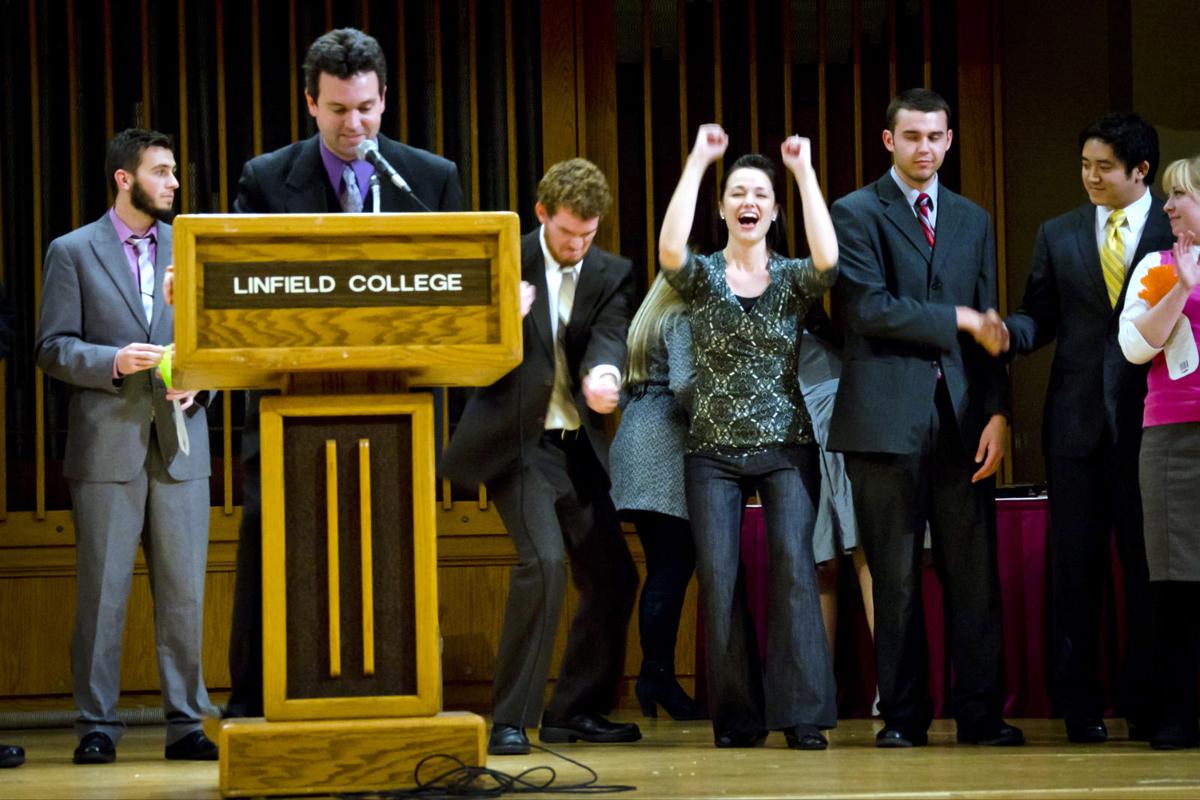Debate team brings home win from conference tournament
After competing against more than 20 other universities from the Pacific Northwest last weekend, the USU Speech and Debate Team won its first conference tournament — and members don’t plan to stop there.
“We are on track to take another conference title after the next conference tournament,” said Tom Worthen, coach of the USU Speech and Debate Team.
The team recently returned from the 81st annual R.D. Mahaffey Memorial Forensics Tournament in McMinnville, Ore.
For the last eight years, the team has competed in the Northwest Forensic Conference and taken first place each time. In 2009, the team competed at the national level where it also took first place.
In the past, Worthen said he has donated a lot of his own money to get the team to competitions, because the university has not allotted funding for it. However, that is finally starting to change, he said.
“The university has worked out funding for the past three to four years, so I don’t have to donate,” Worthen said. “We compete in three or four tournaments a year against 20 to 25 universities at each tournament and usually take first place.”
Worthen said there are several different types of debate and 11 speech events in each competition.
John Kimball, a senior majoring in public health, said most of the members of the team compete in one event, typically a memorized speech. Several individuals on the team also compete in an impromptu speech, where an individual receives a quotation or statement and has 2 minutes of preparation time to prepare a five-minute speech.
Justin Jerez, a junior majoring in philosophy and political science, has been on the team the longest. This is his third year on the team, and he said he has participated in most types of events in a given competition.
“Since then I’ve done all kinds of different events,” he said. “This year so far I’ve done platform speeches. I’ve done debate (National Parliamentary Debate Association) each year as well.”
Debate events consist of International Public Debate Association, which is one-on-one debate, or NPDA, which is teams of two, said junior Chelan Rogers.
“These debates are on current events, such as politics in the United States and elsewhere,” Rogers said. “Debaters get the topic 15 minutes before the round starts, so everyone tries to stay very informed and watch the news a lot.”
Jerez said the NPDA debate is highly technical and can include strategic practices that make it more like a sport. Alternatively, the IPDA is more about logically presenting yourself well.
Quinn Larson, a junior majoring in environmental studies, said one of the challenges of the competition is remembering to not take anything personally.
“It’s fun, but it’s hard when you disagree with the side you’re assigned to defend,” Larson said. “It’s difficult in the sense that you have to think outside the box and outside your own head. But it is eye opening. There are some arguments that you realize make sense. It gets you to see a different perspective and to be more open to some ideas.”
Worthen said one of the reasons the debate team is good is because of all its hard work and practice. Larson agreed. He said he enjoys debate and for him the hard work is worth it.
“With debate you can say almost anything and no one really gets upset. It’s fun to be with that group of people,” Larson said, “It’s fun to have that kind of communication, and I think a lot of people don’t learn as much as they could from talking to other people.”
Jerez said the hardest thing about being on the team is the amount of work he puts in reaps little reward in terms of scholarships or funding.
“The majority of teams we go against have debate scholarships and tons of funding from their schools, and we just don’t have that kind of privilege,” Jerez said.
Jerez said he thinks USU’s team does not receive a lot of funding or scholarship money because it is good enough without it.
“It would be great to have more money, but if we’re able to win national tournaments and be eight-time conference champions with the kind of funding we get, there’s no need to increase funding or offer scholarships to us,” he said. “We would, however, like to get more support from the university for the team.”
Larson said he joined the team because of the importance of public speaking and communication.
“It’s kind of hard to communicate with people if you don’t speak well,” Larson said. “It also lets you focus on other’s views that you may not find acceptable but to other people are. It gets you open minded in that way.”
Larson said having an open mind is necessary in the diverse and constantly changing atmosphere of present-day society.
“I think it’s important to listen to other people’s views and respect them for what they have,” he said. ‘It doesn’t necessarily mean that I have to adopt them, but at least it gives you the perspective that they are an intelligent person who has different views than your own. And you can’t categorize them as being stupid or your own ideas are better.”
Jerez said joining USU’s debate team was a turning point in his education.
“It helped me to think differently and realize the importance of speaking about issues and talking about things that are important,” Jerez said. “I think it’s important to have an avenue to discuss the deeper meanings behind what happens in our society through political and philosophical viewpoints. There’s deeper meaning behind actions in politics and everyday life.”
– amber.murdoch@aggiemail.usu.edu

